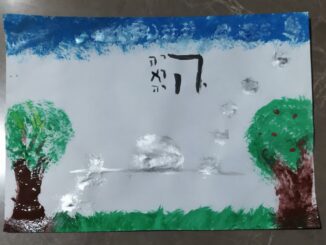
Marriage is meant to bring two people together so they can grow together, become close, and to be the best and happiest version of themselves. Together, they can raise children with their DNA who follow their lead and grow up to be well-adjusted Torah Jews so that Hashem’s world can continue to thrive.
There is no other relationship in the world in which one can have more closeness and an intimate connection other than with their spouse. The emotions in a marriage are unique in unlike in any other relationship. This is why you can see in marriages, there can be the deepest love or the deepest hate towards one another in marriages.
The dream is to grow old together and enjoy our best years together. The way to reach the deep desired connection in marriage is by helping each other grow emotionally and mentally every day. I heard from a woman that at the beginning of her marriage, her husband told her that he is not her mother and that he is not here to “raise her.” He did not understand the essence of the Torah marriage. The Torah tells us that we must grow every day. In spirituality, we cannot remain in the same spot for long, we either grow or we fall.
The essence of a Jewish marriage is all about helping each other physically and spiritually! Mothering each other, being there for the spouse as a sounding board and support system. As the Torah states בראשית ב יח ויאמר ה’ אלהים לא טוב היות האדם לבדו אעשה לו עזר כנגדו In another pusik the Torah states בראשית ב כד על כן יעזב איש את אביו ואת אמו ודבק באשתו והיו לבשר אחד Otherwise, you are not a spouse, but simply a partner to keep the house in order and raise children. This is likely the reason why there is a higher rate of midlife divorces in the frum community, once the children are grown and moved out of the home, once the partnership is no longer needed, the arrangement fails. However, when a couple is in an emotionally good relationship, they enhance each other’s lives and live happily even after all their children are married.
When it comes to children, parents are willing to put in all the work, sacrifice day and night, be their teacher, doctor, nurse, therapist, referee, maid, cook, provider, defender, and protector. However, when it comes to the life partner which leads to our own happiness, and our children’s stability, many are unwilling to do so.
How can two people from different backgrounds and different childhood experiences, come together, understand each other, grow and help each other grow?
We have to start by understanding that every person is very complex and every person has baggage, including traumas. Think about all your inner emotions, you want to be loved, respected, cared for, appreciated, and most of all understood, forgiven and not judged.
So, too, your spouse simply wants the same. How can you accomplish this?
I like to put it in a concrete way so you can visualize it and understand it in order to help yourself and your spouse reach the best version of yourselves and a great marriage.
When a child is born, they start with an empty suitcase. Every big event in life, happy or sad, gets stored in that suitcase as a memory. Every trauma gets thrown into the suitcase with such force that it shatters into lots of small pieces. As we grow, the suitcase gets filled with a variety of memories.
Parents try to help their children fill their suitcase with happy moments and good memories. However, they too have baggage of their own to deal with. Their unresolved negative baggage effects their children as well. There will always be some negative experiences in life that are beyond one’s control.
Once the suitcase is full, it gets closed and a new one is added to the baggage. We carry those suitcases of experiences around with us wherever we go. We each see life through the lens of our baggage, and they mold us into the person we are.
When we get married, as an adult in our own home with our own rules, we want to start fresh with our new spouse, and we attempt to leave those suitcases behind.
However, many couples fail to realize that these suitcases are part of us, these are what shaped us. They contain our happiness, our pain, our life experiences and the life lessons learned so far. We cannot just drop them and leave them behind. The suitcases always go along with us wherever we go.
As a married couple, you now have two sets of suitcases. Each spouse brings their baggage along. Both men and women are looking forward to marrying a spouse who will heal their traumas.
What I find fascinating is that most people do not want to open their own suitcase to examine their baggage because it is too painful to revisit some of those experiences. Instead, each spouse wants the other to open the suitcases and put the broken pieces back together in order to heal.
Understanding the importance and value of looking into your spouse’s suitcase will help you heal
misunderstandings and expectations, which lead to sadness, loneliness and unhappy marriages.
In order to have a fulfilling life, it is very important for each spouse to “open” the other’s suitcases. This will allow you to understand their deep inner workings, emotions, traumas, triggers, thought processes, actions and reactions, which come from their life experiences.
The knowledge will help you understand why your spouse has certain life views and why they react to situations they way they do. Our job as spouse it to learn as much as possible about the baggage in their suitcases, especially the broken pieces that can never be fully repaired.
The broken pieces are the negative, hurtful and abusive experiences in life that leaves the person with trauma, pain and suffering.
Triggers: when you say something innocent to your spouse, and they go off, leaving you wondering what you have said or done to cause such a strong response or reaction, this is a sign that you touched a broken piece in their suitcase. It is an open and raw wound that is looking to be healed. Interestingly enough, most of the time, the hurt person does not realize that they were triggered and they have no idea why they reacted the way they did.
Your reaction is going to determine the happiness and peace in your marriage. If you take it personally and get offended, you will likely start an unnecessary argument and cause a decline in your marriage relationship.
However, if you are aware that you most likely simply touched a broken piece in your spouse’s suitcase, then you won’t get hurt. Instead, you will look for a way to help your spouse understand themselves.
Follow the pattern of what you said or did that triggered your spouse’s strong or negative reaction. Once you see the pattern, you can make sure not to repeat the words or actions that caused your spouse’s pain. Find a good time to discuss it with your spouse, without judgement, so they can do self introspection and understand why they react the way they do. With your love and support, they can heal, the issue will be resolved, and they will gain more inner peace.
When you find yourself reacting strongly, emotionally or irrationally in any situation, don’t be afraid to look into your own suitcase. Try to identify which one of your broken pieces was touched upon, what negative experience is this reminding you of, and what makes you feel triggered.
Once you have a clear understanding, you can move to the phase of openly speaking about your pain. Either discuss it with your spouse who can show you compassion and understanding or with a therapist.
I heard a lecture from a woman who said that she made it her life’s mission to educate others and encourage everyone to contact any person who hurt them. This way he/she can apologize and correct their behavior in the future. This is a win win situation because the hurt person gets to talk about the pain to the one who caused it, and in return, they will feel cleansed and the pain will leave their system and the perpetrator can repent, do teshuvah. Oftentimes, the perpetrator does not even realize how much they have hurt you.
For example, if a teacher humiliated you in front of the class, true, she may have been young and inexperienced, maybe she was overwhelmed with the class, but whatever the case is, she had no right to do so. However, she has no idea of how much pain and trauma she caused you, so she cannot correct her actions even many years later when she is more mature and been through life. Don’t be afraid to call her, and be kind and calm. Be understanding and judge her favorably. Discuss it like the adult you are, not from the place of a hurt child. She deserves to live with the knowledge that she hurt you. Discuss the memory and feeling of that time with her. Listen to her, allow her to explain herself and accept her apology. If she refuses to apologize, know that Hashem will reward you for taking the step to heal and let go of your anger. Hashem will deal with the perpetrator, as He is a God of compassion and justice. If you know that you hurt someone, do the same to reach out and apologize, a few minutes of shame in this world is much easier than an eternity of shame in the world to come.
If your mother did something that hurt you as a child, call her and ask her when would be a good time to talk. Let her know that you understand that the past cannot be changed. Let her know that you don’t need her to 1) feel guilty 2) to do anything or 3) defend herself. You just want her listen to you with an open mind and open heart. Talk to her respectfully. Talk to her about your experience and the pain she caused. When you are done talking, allow her to respond. Maybe she will have the answer you were looking for. Maybe she has no answer. Maybe she will be willing to apologize. In any case, once you spoke about the pain to the person who caused it, the issue will leave your system.
Understand that the perpetrator is also human and struggled with their own dark suitcases, issues and hardships. This does not excuse their behavior, and Hashem will deal with them. However, it gives you a better grip of the situation and allows you as an adult to view things in a different light.
Talking about the pain will help you let go of its strong grip inside you, and your heart will start healing. It will also allow you as an adult to make the conscious decision to no longer allow “that person” to live in your mind rent-free. You will be able to fill your suitcase, heart and mind with new happy memories for yourself, for your spouse, for your children and ultimately for your future generations. As it is written in the Torah משלי יב כה דאגה בלב איש ישחנה ודבר טוב ישמחנה If you feel worried or stressed, talk about it to the correct counterparty, and if you have a good discussion, you will become happier.


